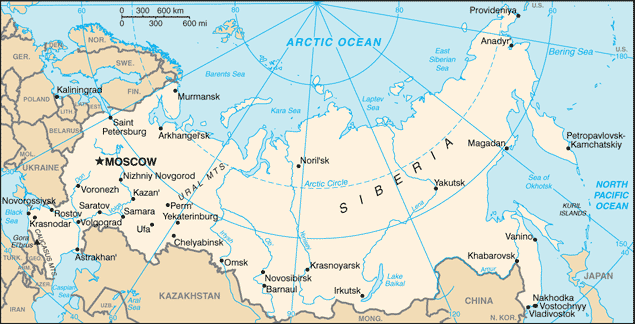Russia

About the Flag
The Russian Federation is a vast maritime nation stretching over numerous time zones in Northern Asia bordering the Arctic Ocean, the North Pacific Ocean and Europe. The Russian language is spoken, and the capital is Moscow. The Chief of State is the President, and the Head of Government is the Premier and Chairman of the Council of Ministers. There is a bicameral Federal Assembly. Russia is a member of the UN and IMO, and is currently negotiating for WTO membership.
Russia has a wealth of natural resources, a well educated population, and a diverse industrial base. In spite of this, it continues to experience formidable difficulties moving from its old centrally planned economy to a free market. Principal exports are petroleum and petroleum products, natural gas, wood and wood products, metals and chemicals. Leading trading partners are the EU and the North American countries. The currency is the ruble.
When the Soviet Union was dissolved, as a first step, Russia simply adopted much of the existing Soviet legislation. Since then, the country has undergone a period of enormous social and economic change, and a mass of new legislation has been introduced in an attempt to reflect this. Nevertheless, there are a number of areas of law, including shipping, in which preperestroika legislation still applies. 1999, however, was a very significant year, with Russia bringing into law its new Merchant Shipping Code (“The Shipping Code”). This is the principal law governing vessel registration and other maritime matters, and replaces the 1968 Merchant Shipping Code of the USSR.
The Shipping Code is a major step in bringing Russia into line with international maritime legislation and standards, and this development was consolidated, also in 1999, by Russia’s accession to a number of international maritime conventions (relating, for example, to arrest of vessels and limitation of shipowners’ liability). Registration of vessels involved in international trade is now regulated by the Order No. 145 issued by the Ministry of Transport of Russia on 29th November 2000. Registration for fishing vessels and vessels sailing Russia’s internal waters are regulated by different rules (see the Rules of Registration and Ownership of Fishing Vessels in Sea Fishing Ports, Order No. 30 of 31st January 2001; and the Rules of Registration of Vessels used on Internal
Russian Waterways, Order No. 18 of 5th March 1993).
Since perestroika, there has been considerable legislative activity in the fields of company law, foreign investment, pledge, etc. Among the laws and regulations governing these areas, the Civil Code of the Russian Federation of 1994 (“the Civil Code”) remains the key piece of legislation. Recently, the Russian government initiated a programme to increase the size of the Russian fleet, modernise it and make it more efficient with the aim to increase its overall value. To date, no legislative changes have resulted from this programme, although some changes are expected.

